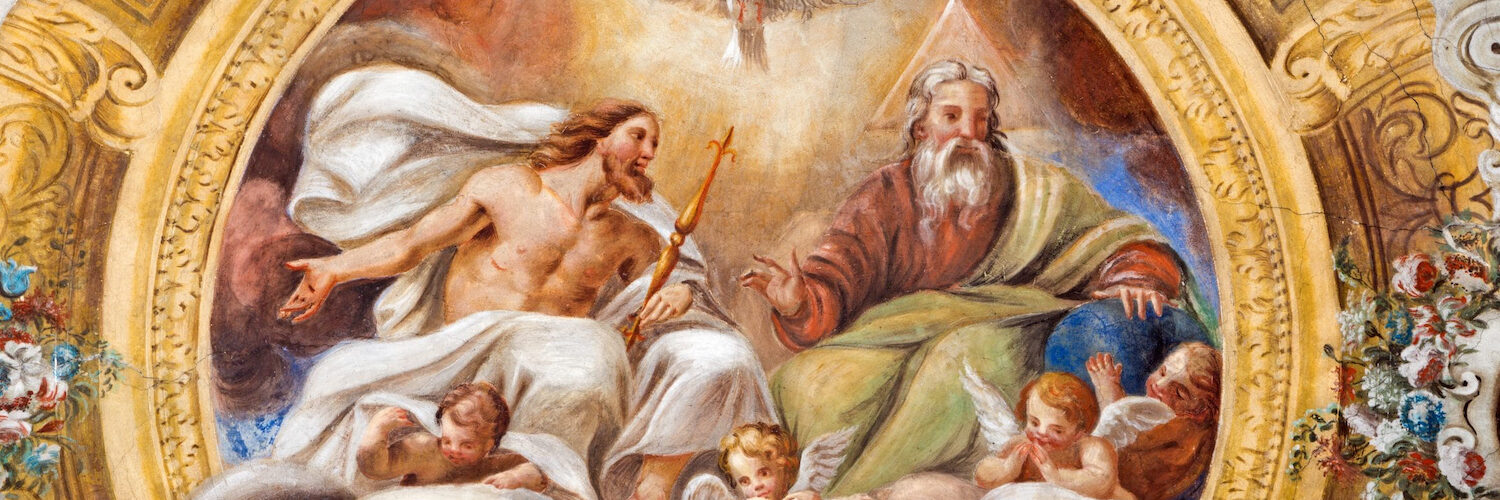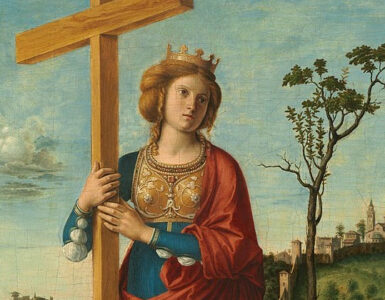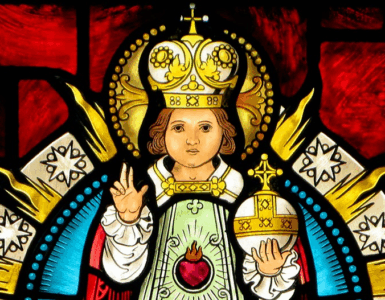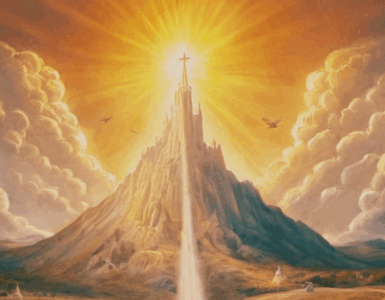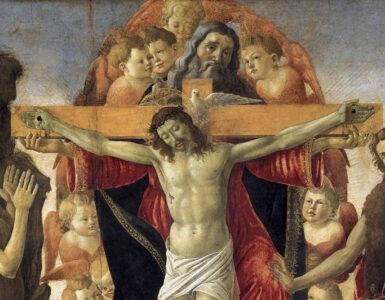On the Sunday following Pentecost, the Church celebrates the Solemnity of the Most Holy Trinity; nowhere, however, does the word “Trinity” appear in the Bible. It was a word invented to describe the mystery of Three Divine Persons in One God—a word invented by a great but controversial third century theologian named Tertullian. A pagan son of a Roman soldier, Tertullian became a lawyer and philosopher in Rome, but soon became disillusioned and appalled at the moral decay of Roman society. He was instead attracted to the moral standards of Christianity, and impressed by the courage of the Church’s martyrs. Accordingly, Tertullian was baptized around the year 195, and ordained a priest a few years later. He relied on his amazing intellect to defend Christian teachings, using his knowledge of philosophy and Greek and Roman literature to explain them in terms pagans would understand. One of his profound sayings was, “God’s Son died; it is believable precisely because it is absurd. He was buried and rose again; it is certain because it is impossible.” He also explained Christian morality by saying that Christians share “all things in common—except our wives.” Considered the first true theologian of the Western Church, Tertullian used his clear, well-organized, and exacting legal mind to create Latin concepts and expressions that proved very useful for the Church.
In light of that, you might assume he’s today considered an important saint—but that isn’t the case. Tertullian became dissatisfied with various Church teachings and practices, and eventually joined a heretical group known as Montanists, who emphasized extreme acts of self-denial and who believed sins committed after baptism could not be forgiven. Tertullian vehemently disagreed with Pope St. Callistus on this issue, who taught that even the worst of sinners could be forgiven if they repented and did sufficient penance. Callistus was one of the most unlikely popes in Church history. As a slave in an important Roman household, he lost a large sum of money entrusted to his care; in deep trouble, he fled, but was captured and sent to prison. Upon his release, he caused a violent disturbance at a Jewish synagogue in Rome, and was arrested and imprisoned again—though he was once more released through the influence of a member of the imperial court. His time in prison must have done him some good, for Callistus settled down, was ordained a deacon and later a priest, and was put in charge of a Church cemetery. When the reigning pope died, Callistus—against all odds—was elected to succeed him. Knowing first-hand the importance of forgiveness and second chances, Pope Callistus insisted it was the Church’s job to show mercy to sinners, rather than condemn them—a teaching the very strict and demanding Tertullian could not accept.
St. Callistus was not a great scholar or religious thinker like Tertullian, and he certainly couldn’t have created a word like “Trinity” or have explained in deep theological terms what it meant. However, the former prisoner and troublemaker understood the centrality of mercy to the Christian message in a way the brilliant but overly-strict theologian Tertullian never grasped or accepted. In the same way, we don’t have to contemplate deeply, let alone understand, the mystery of the Holy Trinity, or explain it in a brilliant and profound manner. No, we simply have to believe it because the Church teaches it as true, and let it guide us in simple and genuine ways. We might say the three great virtues of Faith, Hope, and Love represent the Three Persons in God—and as long as we strive to put them into practice, we will be honoring the Holy Trinity and preparing ourselves for eternal life in Their Presence.
In the Gospel of John (16:12-15), Jesus is speaking to the apostles during the Last Supper, talking at great length about many important things—and then He says, “I have much more to tell you, but you cannot bear it now.” Notice that Our Lord did not say, “Once I’m gone, you’ll be on your own; I won’t be here to teach you and guide you any more, but don’t worry—you’re smart enough to figure things out.” No, Jesus spoke of the Spirit of truth, the Holy Spirit, Whom He and the Father would send to guide His followers to the truth. Because of this promise, we don’t have to be brilliant theologians like Tertullian, creating our own religious language and delving deeply into divine mysteries; we simply need to be humble disciples, like St. Callistus, so that God’s Spirit can work through us. This is how we acquire and live by the wisdom spoken of in Proverbs (8:22-31); this is how we obtain the peace with God through Jesus Christ described by St. Paul in his Letter to the Romans (5:1-5).
As I mentioned, the Three Persons in the Trinity can be represented by the theological virtues of Faith, Hope, and Love. We have faith in God the Father; the vastness, intricacy, and beauty of creation powerfully point to or attest the existence of a Creator, and by having faith in Him, we give our lives purpose and direction and live in harmony with God’s created order. For many centuries, however, humanity was trapped in sin, alienated from creation and itself, and unable to enter Heaven—but, through the prophets, God taught His people to hope for salvation. This hope was fulfilled through Jesus Christ; God sent His Son into the world to proclaim the Good News of salvation and to open the gates of Heaven by His saving death and resurrection. Then, on the great feast day of Pentecost, the Father and the Son together sent the Spirit of Love, the Holy Spirit, down upon the apostles, and They continue to send the Spirit down upon us today through the Church’s sacraments, especially Baptism and Confirmation. Theologians sometimes describe the Holy Spirit as the Love shared between the Father and the Son; what matters in a practical sense is that we open our hearts to the Spirit, so as to love God and our neighbor as fully as we can.
If we have faith in God the Father, we will try to live by His commandments. If we place our hope in God the Son, we will live according to Jesus’ teachings and standards, not those of the world. If we allow the love of the Holy Spirit to burn in our hearts, we will experience a spiritual peace and freedom unlike anything this world can give, while trying to live in a way that attracts others to the truth of the Gospel. The mystery of the Holy Trinity—Three Divine Persons in One God—is not something we’ll ever be able to comprehend or “figure out,” but it is a realty that can shape, empower, and enrich our lives. The Three Persons seek to embrace, surround, and enfold us in Their love—and if we can believe, desire, and allow this, we will fulfill our mission in life, bear witness to the Gospel, and one day arrive at our true home.


